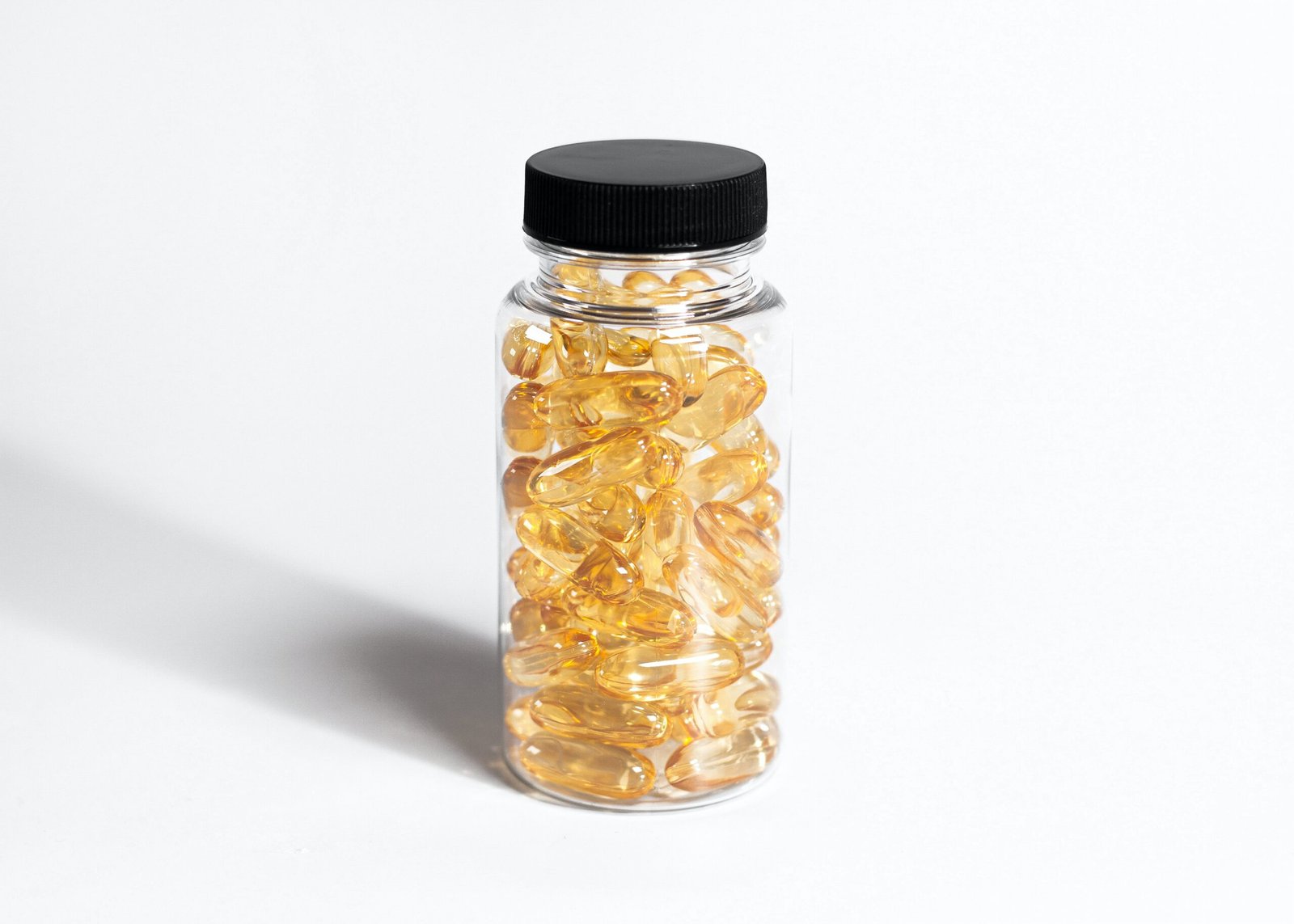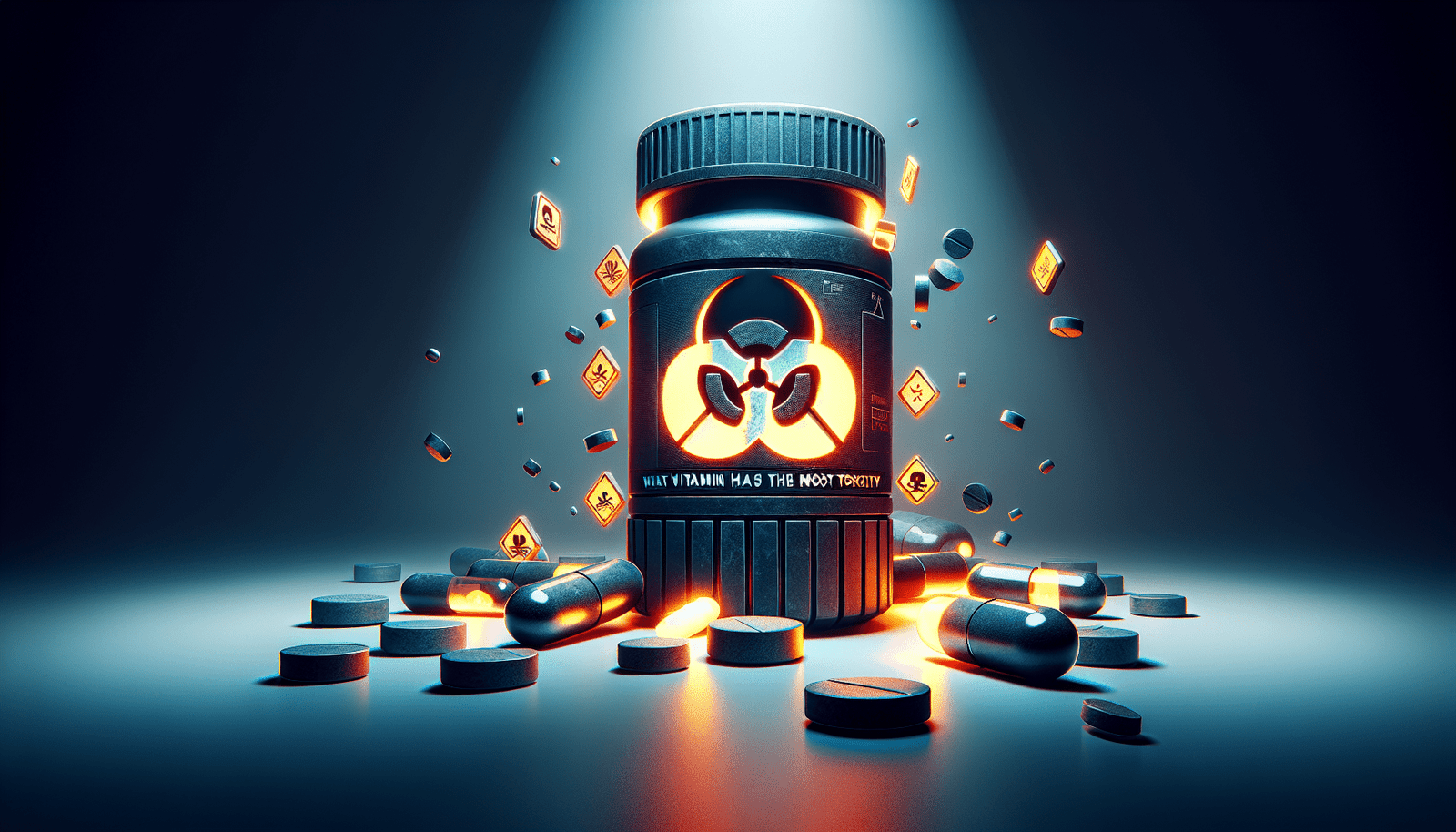Have you ever wondered which vitamin is the most toxic? Although vitamins are essential for our health, too much of a good thing can sometimes become harmful. In this article, we will explore the world of vitamins and discover which one can have the most toxicity if consumed in excessive amounts. So, grab a seat and get ready to uncover the secrets behind vitamin toxicity!
Vitamins and Toxicity
Introduction to Vitamins and Their Role in the Body
Vitamins are essential nutrients that the human body needs in order to function properly. They play a crucial role in maintaining our overall health and well-being. Vitamins are organic compounds that are required in small amounts, but they are vital for various physiological processes such as metabolism, cell growth, and immune function. There are 13 essential vitamins, each with its own unique functions and benefits.
Understanding Vitamin Toxicity
While vitamins are necessary for our health, it is important to note that consuming them in excessive amounts can lead to toxicity, also known as vitamin overdose. Vitamin toxicity occurs when the body has an excessive accumulation of a particular vitamin. This can have adverse effects on our health and may lead to a range of symptoms and complications. It is crucial to understand the potential risks and dangers associated with excessive vitamin intake.
Vitamin A
Overview of Vitamin A
Vitamin A, also known as retinol, is a fat-soluble vitamin that plays a vital role in maintaining healthy vision, promoting cell growth, and supporting the immune system. It is found naturally in animal products such as liver, fish, and dairy, as well as in orange-colored fruits and vegetables like carrots and sweet potatoes.
Symptoms and Effects of Vitamin A Toxicity
Excessive intake of vitamin A can result in a condition known as hypervitaminosis A. Symptoms of vitamin A toxicity may include nausea, dizziness, headache, dry skin, hair loss, and even liver damage in severe cases. Pregnant women should be particularly cautious with their vitamin A intake, as high levels can harm the developing fetus.
Causes of Vitamin A Toxicity
Vitamin A toxicity can occur from consuming large amounts of supplements or medications containing the vitamin, as well as from excessive consumption of animal liver or fortified foods. It is important to note that vitamin A toxicity is generally caused by consuming too much pre-formed vitamin A, such as retinol, rather than the consumption of beta-carotene, which is converted to vitamin A by the body.
Treatment and Prevention of Vitamin A Toxicity
If you suspect vitamin A toxicity, it is essential to consult a healthcare professional for diagnosis and treatment. Treatment usually involves discontinuing the intake of vitamin A supplements or reducing the intake of vitamin A-rich foods. Prevention of vitamin A toxicity involves following the recommended daily intake guidelines and being cautious with the use of vitamin A supplements, particularly during pregnancy.

Vitamin D
Overview of Vitamin D
Vitamin D is a fat-soluble vitamin that aids in the absorption of calcium and promotes healthy bone growth. It is primarily synthesized in the skin when exposed to sunlight, but it can also be obtained through dietary sources such as fatty fish, fortified dairy products, and egg yolks.
Symptoms and Effects of Vitamin D Toxicity
Excessive vitamin D intake can lead to a condition called hypervitaminosis D. Symptoms of vitamin D toxicity may include nausea, vomiting, loss of appetite, excessive thirst, weight loss, and kidney damage in severe cases. It is important to note that vitamin D toxicity is rare and usually occurs from over-supplementation rather than excessive sun exposure or dietary intake.
Causes of Vitamin D Toxicity
Vitamin D toxicity is primarily caused by the excessive intake of vitamin D supplements. This can occur when individuals take high-dose supplements without medical supervision or when there is a prescription error. Since vitamin D is a fat-soluble vitamin, it can build up in the body over time, leading to toxicity if consumed in excess.
Treatment and Prevention of Vitamin D Toxicity
If you suspect vitamin D toxicity, it is crucial to seek medical attention for proper diagnosis and treatment. Treatment usually involves discontinuing the intake of vitamin D supplements and monitoring calcium levels in the blood. Prevention of vitamin D toxicity can be achieved by following the recommended daily intake guidelines and consulting a healthcare professional for guidance on supplementation.
Vitamin E:
Overview of Vitamin E
Vitamin E is a fat-soluble vitamin that acts as an antioxidant in the body. It helps protect cells from damage caused by free radicals and plays a vital role in maintaining healthy skin, eyes, and immune function. Good sources of vitamin E include nuts, seeds, vegetable oils, and leafy green vegetables.
Symptoms and Effects of Vitamin E Toxicity
While Vitamin E toxicity is rare, excessive intake can lead to adverse effects such as nausea, fatigue, gastrointestinal issues, and in rare cases, bleeding disorders. High doses of vitamin E may interfere with the body’s ability to form blood clots, which can be particularly problematic for individuals on blood-thinning medications.
Causes of Vitamin E Toxicity
Vitamin E toxicity typically occurs from consuming high-dose vitamin E supplements, often exceeding the recommended daily intake. It is uncommon to experience toxicity from food sources alone, as it usually requires excessive supplementation.
Treatment and Prevention of Vitamin E Toxicity
If vitamin E toxicity is suspected, it is important to seek medical advice for diagnosis and appropriate treatment. Treatment generally involves discontinuing or reducing vitamin E supplementation. To prevent vitamin E toxicity, it is crucial to adhere to the recommended daily intake guidelines and avoid excessive supplementation without medical supervision.

Vitamin K
Overview of Vitamin K
Vitamin K is a fat-soluble vitamin that plays a crucial role in blood clotting, bone health, and the regulation of calcium in the body. It is found in leafy green vegetables, such as kale and spinach, as well as in some animal products.
Symptoms and Effects of Vitamin K Toxicity
Vitamin K toxicity is rare and usually occurs as a result of excessive supplementation. Symptoms may include flushing, sweating, rapid heartbeat, and low blood pressure. It is important to note that vitamin K toxicity is rare, and the majority of people receive sufficient amounts from a balanced diet.
Causes of Vitamin K Toxicity
Vitamin K toxicity is primarily caused by excessive intake through supplements, as it is uncommon to reach toxic levels through dietary intake alone. It is important to follow recommended dosage guidelines and consult a healthcare professional before starting any vitamin K supplementation regimen.
Treatment and Prevention of Vitamin K Toxicity
If vitamin K toxicity is suspected, it is essential to seek medical advice for appropriate treatment. Treatment usually involves discontinuing or reducing vitamin K supplements. To prevent vitamin K toxicity, it is crucial to follow the recommended dosage guidelines and consult a healthcare professional for guidance on supplementation.
Vitamin B3 (Niacin)
Overview of Vitamin B3
Vitamin B3, also known as niacin, is a water-soluble vitamin that plays a critical role in energy production, cellular communication, and the maintenance of healthy skin, digestive system, and nervous system. Good sources of niacin include meat, fish, whole grains, and legumes.
Symptoms and Effects of Niacin Toxicity
Niacin toxicity, also referred to as niacin overdose, is rare and usually occurs from extremely high-dose supplementation. Symptoms may include flushing of the skin, headache, dizziness, rapid heartbeat, and liver damage in severe cases. Niacin toxicity can also lead to an increase in blood sugar levels, making it important for individuals with diabetes to monitor their intake.
Causes of Niacin Toxicity
Niacin toxicity is primarily caused by the excessive intake of niacin supplements, especially when consumed at doses well above the recommended daily intake. It is important to note that consuming niacin through a balanced diet is generally safe and does not pose a risk of toxicity.
Treatment and Prevention of Niacin Toxicity
If niacin toxicity is suspected, it is crucial to consult a healthcare professional for appropriate diagnosis and treatment. Treatment typically involves discontinuing or reducing niacin supplementation. To prevent niacin toxicity, it is important to adhere to the recommended daily intake guidelines and consult a healthcare professional before starting any high-dose niacin regimen.

Vitamin B6
Overview of Vitamin B6
Vitamin B6, also known as pyridoxine, is a water-soluble vitamin that plays a crucial role in the metabolism of proteins, carbohydrates, and fats. It is involved in various physiological processes, including the production of neurotransmitters and the synthesis of red blood cells. Good sources of vitamin B6 include meat, fish, potatoes, bananas, and fortified cereals.
Symptoms and Effects of Vitamin B6 Toxicity
Excessive intake of vitamin B6 can result in a condition called pyridoxine toxicity. Symptoms may include numbness, tingling sensations in the hands and feet, difficulty walking, and in severe cases, irreversible nerve damage. It is important to note that vitamin B6 toxicity is rare and is more likely to occur from high-dose supplementation rather than dietary intake alone.
Causes of Vitamin B6 Toxicity
Vitamin B6 toxicity usually occurs from consuming high-dose vitamin B6 supplements that exceed the recommended daily intake. It is important to follow the recommended dosage guidelines and consult a healthcare professional before starting any high-dose vitamin B6 regimen.
Treatment and Prevention of Vitamin B6 Toxicity
If vitamin B6 toxicity is suspected, it is crucial to seek medical attention for appropriate diagnosis and treatment. Treatment generally involves discontinuing or reducing vitamin B6 supplementation. To prevent vitamin B6 toxicity, it is important to adhere to the recommended dosage guidelines and consult a healthcare professional for guidance on supplementation.
Vitamin C
Overview of Vitamin C
Vitamin C, also known as ascorbic acid, is a water-soluble vitamin that acts as a powerful antioxidant and plays a vital role in collagen synthesis, immune function, and wound healing. It is found in a variety of fruits and vegetables, including citrus fruits, strawberries, broccoli, and bell peppers.
Symptoms and Effects of Vitamin C Toxicity
Excessive intake of vitamin C is uncommon, as the body regulates its absorption efficiently. However, very high doses of vitamin C, typically consumed through supplements, may lead to gastrointestinal issues such as diarrhea, nausea, and stomach cramps. Individuals with a history of kidney stones should exercise caution when consuming excessive amounts of vitamin C.
Causes of Vitamin C Toxicity
Vitamin C toxicity is primarily caused by the consumption of high-dose supplements that exceed the recommended daily intake. It is important to note that getting vitamin C from food sources is generally safe and does not pose a risk of toxicity.
Treatment and Prevention of Vitamin C Toxicity
If vitamin C toxicity is suspected, it is important to seek medical advice for appropriate diagnosis and treatment. Treatment usually involves discontinuing or reducing vitamin C supplementation. To prevent vitamin C toxicity, it is crucial to follow the recommended daily intake guidelines and consult a healthcare professional before starting any high-dose vitamin C regimen.

Vitamin B12
Overview of Vitamin B12
Vitamin B12, also known as cobalamin, is a water-soluble vitamin that plays a crucial role in nerve function, DNA synthesis, and red blood cell production. It is primarily found in animal products such as meat, fish, dairy, and eggs, making it important for vegetarians and vegans to ensure sufficient intake through fortified foods or supplements.
Symptoms and Effects of Vitamin B12 Toxicity
Excessive intake of vitamin B12 is uncommon and is unlikely to cause toxicity. The body is generally efficient at excreting excess amounts through urine. However, in rare cases, high-dose supplementation may lead to mild symptoms such as itching, rash, and diarrhea.
Causes of Vitamin B12 Toxicity
Vitamin B12 toxicity is rare and usually occurs as a result of excessive supplementation. It is important to note that getting vitamin B12 from dietary sources is generally safe and does not pose a risk of toxicity.
Treatment and Prevention of Vitamin B12 Toxicity
If vitamin B12 toxicity is suspected, it is essential to seek medical advice for appropriate diagnosis and treatment. Treatment typically involves discontinuing or reducing vitamin B12 supplementation. To prevent vitamin B12 toxicity, it is crucial to follow the recommended daily intake guidelines and consult a healthcare professional before starting any high-dose vitamin B12 regimen.
Vitamin B9 (Folate)
Overview of Vitamin B9
Vitamin B9, also known as folate or folic acid, is a water-soluble vitamin that plays a vital role in DNA synthesis, red blood cell formation, and the prevention of certain birth defects. It is found in foods such as leafy green vegetables, legumes, fortified grains, and citrus fruits.
Symptoms and Effects of Folate Toxicity
Excessive intake of folate from food sources is generally safe, as the body efficiently excretes excess amounts. However, high-dose supplementation may lead to symptoms such as nausea, abdominal cramps, and skin reactions. It is important to note that folate toxicity is rare and is more likely to occur from supplements rather than dietary intake alone.
Causes of Folate Toxicity
Folate toxicity usually occurs from consuming high-dose folate supplements that exceed the recommended daily intake. It is important to follow the recommended dosage guidelines and consult a healthcare professional before starting any high-dose folate regimen.
Treatment and Prevention of Folate Toxicity
If folate toxicity is suspected, it is crucial to seek medical attention for appropriate diagnosis and treatment. Treatment generally involves discontinuing or reducing folate supplementation. To prevent folate toxicity, it is important to adhere to the recommended daily intake guidelines and consult a healthcare professional for guidance on supplementation.
In conclusion, while vitamins are essential for our health, it is crucial to be mindful of their potential toxicity when consumed in excessive amounts. Understanding the symptoms, causes, treatment, and prevention of vitamin toxicity can help us maintain a balanced and healthy intake of these essential nutrients. It is always recommended to consult a healthcare professional for personalized guidance on vitamin intake and supplementation to ensure optimal health and well-being.
